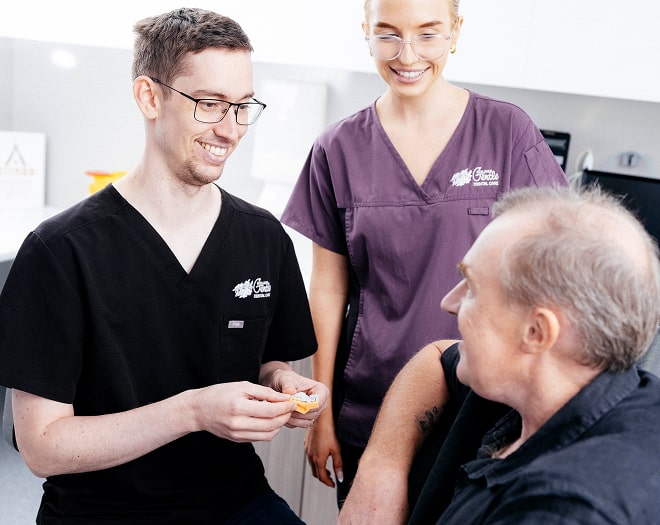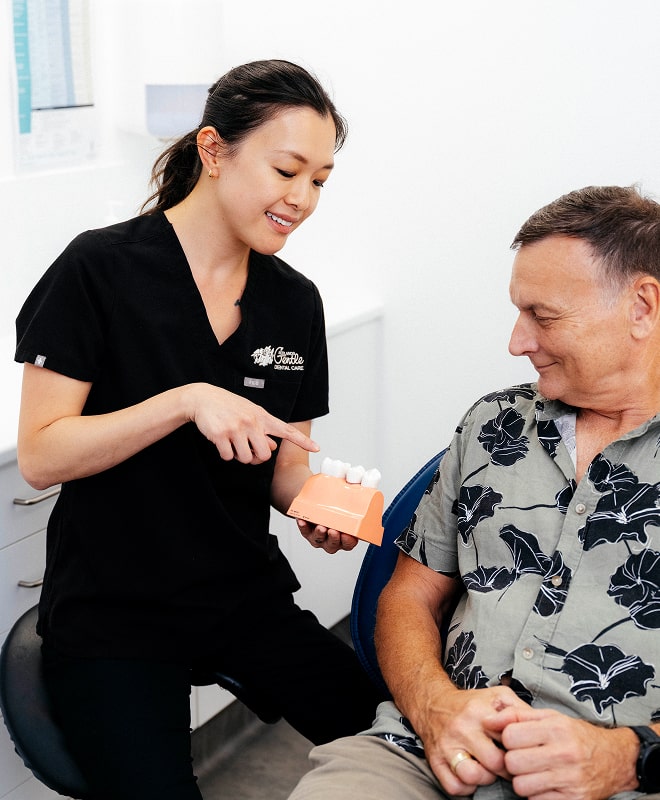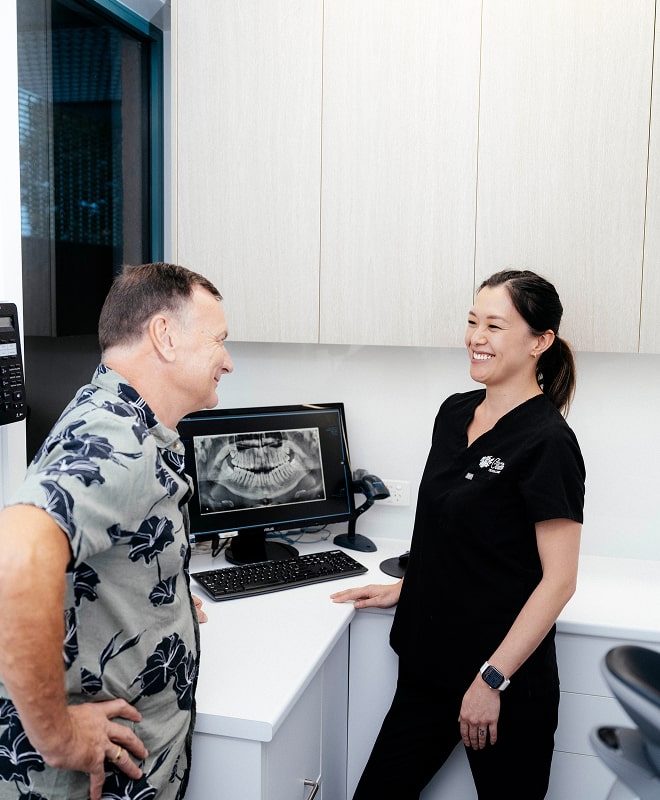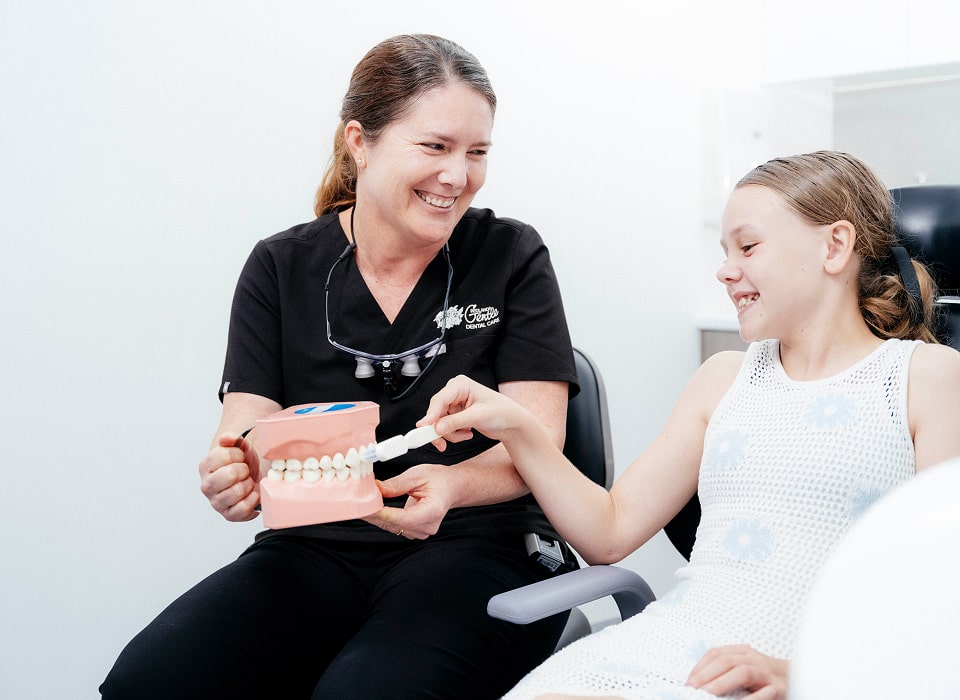Secure and Comfortable Prosthetics Achieved With Implant-Retained Dentures
in Brisbane

Find the Comfort to Eat Again with Advanced Implant-Retained Dentures
Who Should Consider Implant-Retained Denture Procedure?
Implant-retained dentures offer a reliable and comfortable alternative for those struggling with traditional dentures. This advanced option enhances stability and restores confidence in daily activities. Candidates who may benefit from this procedure normally have the following qualities:
- Candidates must have sufficient jawbone density to provide a secure foundation for the implants and maintain stability for the dentures.
- Healthy gums are essential, as gum disease or inflammation can compromise the success of the procedure.
- Being in overall good health is important, as conditions like uncontrolled diabetes or immune system issues may affect the healing process.
- Non-smokers or those willing to quit smoking are ideal, as smoking can reduce the success rate of implants.


The Advantages of Implant-Retained Dentures to the
Quality of Life
Replacing missing teeth can significantly impact your daily life, from eating to speaking and smiling confidently. Implant-retained dentures are a modern restoration option that addresses these challenges effectively. This is how they can enhance your quality of life:
- Implant-retained dentures eliminate slipping or clicking, offering a secure and reliable option for daily activities like speaking and eating.
- They provide better support for facial structure, helping to maintain a more youthful appearance by reducing sagging caused by tooth loss.
- These dentures distribute biting forces evenly, reducing pressure on gums and improving oral comfort.
- By anchoring to dental implants, they promote long-term jawbone health and reduce the risk of bone deterioration.
Quality Dental Implants
Check Out Our Dental Implant Services that Combine Precision, Care, and
Exceptional Results
Personalised Dental Implant Consultation For Your Unique Needs
Our Payment Options
Find What Works for Your Financial Needs With Our Dental Payment Options
Child Dental Benefits Schedule
Invest in your child's smile with the Child Dental Benefits Schedule (CDBS). This government program offers eligible families financial support for essential dental services, promoting good oral health habits from an early age.
The CDBS covers up to $1,095 over two years for basic dental care like check-ups, cleanings, and fillings for children aged zero to 17. Eligibility depends on Medicare status and specific government payments, making quality dental care more accessible to families.
Learn MoreDental Services for DVA Card Holders
Veterans deserve high-quality dental care, and the Department of Veterans' Affairs (DVA) program delivers just that. The program offers dental benefits that vary based on card type.
Gold Card holders receive comprehensive cover for clinically necessary treatments, from routine check-ups to advanced procedures. White Card holders are covered for dental care related to accepted service-related conditions or mental health needs. Our clinic proudly supports veterans by providing high-quality dental care to maintain their overall health.
Learn MoreHumm
Simplify your dental care payments with Humm, a flexible financing option that lets you smile now and pay later. This interest-free payment plan allows you to spread the cost of your dental treatments over time, making essential care more accessible.
Humm is available for various dental services, from routine check-ups to more complex procedures. With instant approval and the ability to manage your account online, Humm helps you prioritise your oral health without financial stress.
Learn MoreZip
We offer Zip to help patients manage treatment costs. With credit limits between $1,000 and $50,000, eligible patients can select flexible repayment terms from three to 60 months, making it easier to manage costs.
Zip is ideal for anyone needing dental care without upfront costs. The user-friendly app allows you to track payments easily, so you can stay on budget while prioritising your oral health.
Learn MoreSuperCare
With the help of SuperCare, eligible patients can release their superannuation funds early to access essential dental procedures. This option is suitable for families lacking sufficient health funds or available resources, covering services such as orthodontics, implants, and root canal therapies.
SuperCare's consultants guide you through the straightforward application process, simplifying what can often be complex. This service enables you to prioritise your family's oral health without the burden of upfront costs.
Learn MoreAfterPay
Experience the convenience of dental care with Afterpay, allowing you to receive treatments now and pay later in four easy instalments over six weeks. This payment option is available to anyone over 18, a practical choice for adults looking to enhance and maintain oral health.
With no interest charges when payments are made on time, Afterpay promotes responsible budgeting. Payments are automatically deducted from your linked debit or credit card for a smooth experience.
Learn MoreBupa Preferred Provider
Enjoy exclusive benefits and hassle-free claims when you choose our clinic, a Bupa Preferred Provider, for your dental health needs. Our patients can access a comprehensive range of services, including check-ups and major procedures, often at reduced out-of-pocket costs.
Members First Ultimate also offers 100% back on two dental check-ups and cleans every six months, making regular oral care more affordable. Our partnership with Bupa allows you to receive quality care while maximising your benefits.
Learn MoreHCF Preferred Provider
Experience affordable, high-quality dental care at Redlands Gentle Dental Care. As an HCF preferred provider, patients with eligible dental cover can access reduced out-of-pocket costs, no-gap services for selected treatments, and streamlined claims processing.
HCF members can take advantage of these benefits by choosing our clinic for their dental needs. Check your policy to understand covered treatments and annual limits, and let us help you achieve a healthier, brighter smile.
Learn Morenib Preferred Provider
Access professional dental care at our clinic, a trusted part of nib's First Choice network. As a nib Preferred Provider, we offer members the opportunity to receive quality dental care at agreed rates. This provides a transparent and straightforward experience for your dental needs.
Nib members benefit from reduced out-of-pocket costs and simplified claims processes at our clinic. To make the most of your cover, review your policy for applicable limits and service inclusions.
Learn MoreUnderstand More About Implant-Retained Dentures
Frequently Asked Questions
What is the difference between implant-retained dentures and traditional dentures?
Implant-retained dentures and traditional dentures differ in their stability, comfort, and long-term oral health benefits. These two options for replacing missing teeth offer distinct advantages and considerations for patients seeking dental prosthetics.
Traditional Dentures
Traditional dentures are removable appliances that rest on the gums and rely on suction for stability.
- They sit on top of the gums without a fixed attachment.
- These dentures can be taken out for cleaning and maintenance.
- Regular dentures may shift during eating or speaking, causing discomfort.
- Denture adhesives are sometimes used to stay in place throughout the day.
- These dentures normally last five to eight years with proper care.
Implant-retained Dentures
Implant-retained dentures are secured to dental implants surgically placed in the jawbone, providing enhanced stability and function.
- They attach to two to four dental implants for increased stability.
- Implant-retained dentures can be taken out by the patient for cleaning.
- They offer better stability during eating and speaking activities.
- These dentures do not require adhesives to stay in place.
- They are often more comfortable and allow for improved chewing.
- With proper care, these dentures are more likely to last longer than traditional options.
Choosing between these options depends on factors such as oral health, budget, and personal preferences. We recommend consulting a dental professional to determine the right option for your needs.
How do implant-retained dentures differ from all-on-4 implants?
Implant-retained dentures and All-on-4 implants differ in their design, application, and overall approach to tooth replacement. Here’s a detailed discussion of their differences:
Implant-retained Dentures
Implant-retained dentures are removable prosthetics anchored to dental implants in the jawbone.
- They use two to four implants to secure a full denture.
- The denture can be taken out for cleaning and maintenance.
- They provide more stability than traditional dentures but less than fixed options.
- The implant-retained dentures procedure is often more affordable than full-arch fixed implant options.
- They may require a periodic adjustment process or replacements of the denture component.
All-on-4 Dental Implants
All-on-4 implants are a securely attached, full-arch restoration supported by four strategically placed implants:
- This technique uses four implants to support a full arch of securely attached teeth.
- The prosthetic teeth are surgically attached and cannot be taken out by the patient.
- All-on-4 implants provide a more stable and natural-feeling outcome than removable options.
- They often require less bone volume, potentially avoiding the need for bone grafting.
- All-on-4 implants usually have a higher initial cost but may offer long-term cost-effectiveness.
Both options can significantly improve the quality of life for those with multiple missing teeth. The choice between implant-retained dentures and All-on-4 implants depends on personal needs, preferences, and budget considerations.
Are implant-retained dentures removable, or are they secured in place?
Is it easier to eat with implant-retained dentures than conventional dentures?
Will the implant-retained dentures feel secure and comfortable while speaking or eating?
Can I switch from traditional dentures to implant-retained dentures?
Yes, you can switch from traditional dentures to custom-fitted implant-retained dentures. This transition is possible for many patients who are looking for a more stable and comfortable alternative to their conventional dentures.
However, switching to implant-retained dentures requires sufficient jawbone density to support the dental implants. If you’ve worn traditional dentures for a long time, you may have experienced some bone loss. In such cases, your dentist might recommend bone grafting to build up the jawbone before placing the implants.
What is the process for getting implant-retained dentures?
Getting our affordable implant-retained dentures involves a multi-step process that combines oral surgery and prosthetic dentistry. The implant-retained dentures procedure normally follows these steps:
- Initial consultation:
Your dentist evaluates your oral health, takes X-rays, and discusses your options. - Treatment planning:
A customised plan is created, considering factors like bone density and the number of implants needed. - Preparatory procedures:
Some patients may require tooth extractions or bone grafting before implant placement. - Implant surgery:
Dental implants are surgically placed into the jawbone under local anaesthesia. - Healing period:
After the dental implant surgery, the implants fuse with the bone over several months, a process called osseointegration. - Abutment placement:
Once healed, small connectors called abutments are attached to the implants. - Denture fabrication:
Impressions are taken to create custom-fitted dentures that attach to the implants. - Denture fitting:
The final dentures are attached to the implants and adjusted for comfort and function. - Follow-up appointments:
Regular check-ups are necessary to check for the proper fit and function of your new implant-retained dentures.
The process requires patience, but the result is a stable, comfortable set of teeth. We encourage patients to discuss this treatment option with our team to determine if our affordable implant-retained dentures are suitable for their needs.
How many dental implants are used for implant-retained dentures?
The number of dental implants used for implant-retained dentures usually ranges from two to six. The following factors determine the exact number of implants required for each patient:
- Jaw location:
The upper jaw often requires more implants due to its softer bone structure. This softer bone provides less stability, so additional implants help distribute the load more evenly. - Bone density:
Patients with lower bone density may need extra implants for adequate support. More implants can compensate for the reduced strength of the bone, providing a stable foundation for the denture. - Denture type:
Fixed dentures generally require more implants than removable options. Fixed dentures need additional support to withstand constant pressure, while removable dentures can be taken out, reducing stress on the implants. - Arch cover:
Full-arch replacements often need more implants than partial dentures. A full arch bears more weight and pressure, necessitating additional implant support for long-term stability and function. - Patient’s bite force:
Patients with stronger biting forces might require extra implants. More implants help distribute the increased pressure from a strong bite, preventing overload on any single implant.
Determining the right number of implants is important for long-term success and comfort. We recommend scheduling a detailed consultation with our team to assess your specific needs and create a personalised form of treatment plan.
How do you clean implant-retained dentures?
Proper cleaning after an implant-retained denture procedure is necessary for maintaining oral health and extending the life of your prosthetic. Here are the steps to effectively clean your implant-retained dentures:
- Take the dentures out:
Gently take out your implant-retained dentures as instructed by your dentist. Use both hands to disengage the dentures from the implant attachments carefully. - Rinse thoroughly:
Hold the dentures under lukewarm running water to eliminate loose food particles and debris. Avoid using hot water, as it may warp the denture material. - Use a soft-bristled brush:
Gently brush all surfaces of the dentures with a non-abrasive denture cleaner or mild soap. Use circular motions to clean every nook and cranny, paying extra attention to the fitting surface. - Clean attachments:
Carefully brush the attachment points on the denture, making sure they are free from any buildup. Use a soft interdental brush for hard-to-reach areas. - Soak overnight:
Place the dentures in a denture-soaking mixture or plain water when not in use. This keeps them moist to prevent warping. - Rinse before wearing:
Thoroughly rinse the dentures with water before reinserting them into your mouth. This eliminates any residual cleaning liquid that may irritate your gums. - Keep your mouth clean:
Brush your gums, tongue, and the remaining natural teeth with a soft toothbrush. This promotes overall oral hygiene and helps prevent infections.
Regular cleaning helps prevent staining, bad breath, and potential infections associated with poorly maintained dentures. We recommend scheduling regular visits to your dentist so your implant-retained dentures can continue to fit and function properly.
How long do implant-retained dentures last?
You can enjoy the advantages of implant-retained dentures for 5-15 years for the denture attachment and up to 20 years for the implant posts. The following factors can influence the longevity of implant-retained dentures:
- Oral hygiene practices:
Proper cleaning of both the dentures and implants helps prevent bacteria buildup and gum disease. Daily brushing, flossing, and rinsing eliminate food particles and plaque that can lead to infections around the implants. - Quality of dental implant materials:
Higher-grade materials like titanium or zirconia offer better durability and integration with bone tissue. These materials resist corrosion and wear, contributing to the implants’ longevity. - Diet and nutrition:
A balanced diet rich in calcium and vitamin D supports bone health, maintaining the strength of the jawbone that holds the implants. Adequate nutrition also promotes overall oral health and healing. - Smoking and alcohol consumption:
Smoking restricts blood flow to the gums, impeding healing and increasing infection risk. Excessive alcohol can weaken bones and affect implant stability over time. - Chronic health conditions:
Diseases like diabetes can slow healing and increase infection risk. Addressing these conditions through proper medical care and lifestyle choices helps maintain implant health. - Dental clinic check-ups:
Regular visits allow for early detection and addressing any issues. Your dentist can spot potential problems and make adjustments to prevent further damage.
Proper maintenance is key to making the most of the lifespan and advantages of implant-retained dentures. We recommend scheduling regular check-ups with your dentist to monitor the condition of your dentures and address any concerns promptly.
How much do implant-retained dentures cost?
The cost of implant-retained dentures can start at $8,000 and up. However, many factors can influence the total cost of implant-retained dentures:
- Number of implants:
More implants may be needed for better support, increasing the overall cost. - Implant type:
Traditional implants cost more than mini implants but offer greater stability and longevity. - Preparatory procedures:
Some patients may need bone grafts or tooth extractions before implant placement, adding to the expense. - Denture quality:
Higher-quality materials and craftsmanship result in more durable and natural-looking dentures but at a higher cost. - Dentist’s experience:
More experienced dentists may charge higher fees but often provide better outcomes and reduced risk of complications. - Clinic location:
Dental costs can vary depending on where you live, with major cities often having higher prices.
We recommend discussing your needs with a dental professional for an accurate cost estimate for the implant-retained dentures procedure. Many dental clinics offer payment plans or financing options to help make implant-retained dentures more accessible.
Are implant-retained dentures more expensive than traditional dentures?
